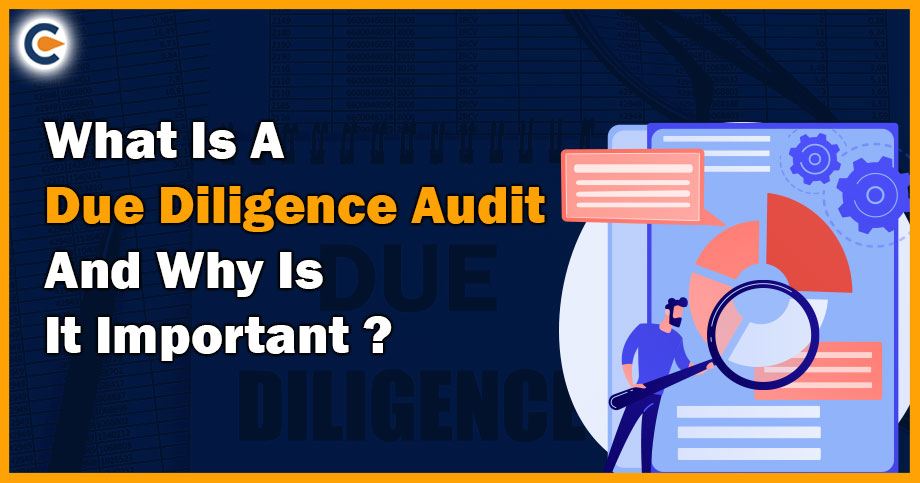Due Diligence Audit is an exhaustive examination of the financial health of the whole firm. A takeover, merger, or any other substantial action that might have a negative impact on the financials of one or more organizations is often preceded by an audit of this sort being carried out. Audits of this kind are also commonly carried out before any other important move. Auditors do such inspections to ensure there are no concealed debts.
It is possible to draw parallels between the process of corporate due diligence and that of a standard background check. Companies that wanted to be purchased often made efforts to present themselves to potential purchasers in the most favorable light imaginable. While the company’s merits are often emphasized, the weaknesses of the business are seldom brought up for discussion. Before hiring someone, a company should do a due diligence audit that includes a background check and qualification check.
The Method Of Doing One’s Due Diligence Consists Of The Following Steps:
- When considering whether or not to invest in a certain firm, it is important to be aware of the potential financial and legal risks[1].
- Constructing an assessment based mostly on legitimacy of a prospective company’s operations and its assets.
- The reduction of potential negative aspects of an investment opportunity.
- It covers not just the challenges that were stated before as well as the challenges that are outlined below.
- Evaluation of the financial and business facts presented at the beginning of a sale or strategic divestiture, free from any biases or preconceptions.
- Intensive collection, analysis, and assessment of financial, commercial, and tax information.
- Collecting and analyzing monetary information in preparation for the submission of bids.
- Understanding the Legal Consequences That Result from Contracts.
Due Diligence in Auditing Transactions
Discussion with potential buyers and their accountants about accounting matters putting the buyer’s due diligence at jeopardy leads to Provision of Services for Carrying out All-Inclusive Audits.
- Finding evidence that is difficult to collect be one of the key goals of a due diligence audit. If a purchasing organization conducts these kinds of audits routinely, they are almost often carried out behind closed doors. It is common practice for organizations to hire private investigators without first expressing the specific goals of the inquiry.
- In many cases, the foundations of a due diligence audit are businesses that specialize in forensic accounting. This workforce has been provided with the proper training to investigate anomalies in the financial records of the organization. In addition to the standard accounting services they provide, forensic accountants have the potential to unearth previously unknown assets and liabilities.
- An audit of due diligence is a comprehensive examination of all aspects of an organization’s financial situation. This form of audit is often carried out in the weeks or months leading up to a takeover, merger, or any other significant move that has the potential to have a negative influence on the financials of one or more organizations. Auditors conduct these kinds of checks to verify that there are no hidden obligations.
- It is possible to draw parallels between the process of corporate due diligence and that of a standard background check. Companies that wanted to be purchased often made efforts to present themselves to potential purchasers in the most favorable light imaginable. While the company’s merits are often emphasized, the weaknesses of the business are seldom brought up for discussion. Before hiring someone, a company should do a due diligence audit that includes a background check and qualification check.
Why Does Due Diligence Audit Matter?
- If a deal is supported by an audit of its due diligence, the probability of it being successful is boosted. If there was any unethical behavior throughout the transaction, it is quite probable that it would be found out during the audit of the due diligence.
- It improves the credibility of the data and enables you to make a conclusion that is in line with common sense.
- As a consequence of this, the relevance of a thorough audit of one’s due diligence might be quite different depending on who you ask.
- The buyer will know they have made the best investment possible from their point of view thanks to a due diligence audit. They won’t have the impression that they’ve been misled, and they could feel more at ease with the purchase, knowing that it has a lower risk of harm than some of the alternatives they’ve considered.
- An audit of the seller’s due diligence is beneficial for the seller since it will boost the buyer’s confidence in them. It’s possible that the additional fees associated with doing a due diligence audit may seem pricey at first, but in the long run, they will prove to be well worth it in order to ensure a smooth and uncomplicated conclusion to the transaction.
Types of Due Diligence Audit
During the course of due diligence, several aspects, including financial ones, are explored.
- Audit of the Supply Chain’s Due Diligence: A supply chain due diligence audit is a method that a firm goes through to evaluate prospective suppliers to see whether there are any dangers involved in doing business with them. This category includes not just ethical and environmental dangers but also those of a legal and governmental nature.
- A Tax Due Diligence Audit: Identifies and Assesses Significant Tax Risks on the Buying Side of a Transaction A tax due diligence audit identifies and evaluates major tax risks on the purchasing side of a transaction. During the course of the tax due diligence process, it is absolutely necessary to confirm that sufficient protections are in place to protect the buyer from any unanticipated tax liabilities. The use of contractual tax guarantees and indemnities is now the most common way that tax risks may be mitigated in real practice.
- Market Conditions Audit: The market due diligence audit is done independently from the data collected by the organization. Interviews with industry experts, rivals, consumers, and other third parties are often included in market due diligence.
- The phrase “HR due diligence”: refers to an audit of a firm’s management, which includes assessing the effectiveness of senior management as a whole and determining how effectively they have assisted the company in achieving its goals. It is vital to do a management team analysis of any possible partners before finalizing a business transaction.
- Audit of the Information System’s: Due Diligence An information technology (IT) due diligence audit is an evaluation that can be performed on any company that has a business that is supported or occasionally enabled by information technology (IT) or digital capabilities. This type of audit aims to identify performance, liabilities, key risks and opportunities, as well as potential investment requirements associated with the target company’s information technology organization and information technology engine.
In order to do an audit of due diligence for reconciliation, it is necessary to compare the recorded transactions and activities to the paperwork that is linked with them. In addition to that, it entails smoothing out any wrinkles that have recently emerged. At the very least once a year, you should have an independent auditor go over your books, but you should examine your own books and do a bank reconciliation at least once a month to spot any potential problems.
- A Legal due Diligence Audit: Aims to ensure that the company, trade, or transaction in question is as safe, profitable, and free of potential risks as is practically possible.
- An Environmental due Diligence Audit: Assesses a site’s environmental state and the dangers it involves. It is possible for private owners, land developers, bankers, and lawyers to start the procedure, regardless of whether they are moving in, purchasing, or refinancing the property.
- Operational due Diligence Audit: During the process of mergers and acquisitions, an operational due diligence audit is the procedure through which a possible buyer evaluates the operational aspects of a target company. Operational Due Diligence Audit refers to this procedure. The corporate sector is the most prevalent setting for the practice of operational due diligence, which is more widespread than any other sort of due diligence.
Checklist for Conducting Due Diligence Audit
Following is the checklist for conducting Due Diligence Audit:
1. Legal:
- The record of any lien or limitations that have been placed on the property.
- Contracts that place limitations on the company’s ability to function independently are a primary focus of contracting efforts.
- Indemnification and other contractually obligated duties and responsibilities.
- Include a synopsis of the target’s compliance programme as well as copies of any relevant rules, procedures, and other paperwork in your submission.
- Confirm that doing business with the company will not result in the violation of any OFAC prohibitions or other rules of a similar kind.
- Find out if the target has a physical or a virtual presence, along with any other duties that may be associated with it.
- A condensed overview of the relevant legislation and/or the company’s actions, including an examination of potential upcoming changes.
2. Financial:
- Financial accounts of the firm that have been audited for the applicable time period
- A reconciliation of management accounts covering a previously specified time period
- Contracts for investments that the firm has committed to honoring
- Registration and Authentication Documents (including TAN, VAT, etc.)
- The Outward Expression of Cash Flow
- Some thoughts on the evolution of accounting policies and practices
- Working capital on a quarterly basis and the factors that contribute to large changes
- Collaborations as well as endeavors spanning several disciplines
- An investigation on the progression of ownership throughout the course of the previous two years.
- A quick look at the operational data for each month
- A comprehensive explanation of the way in which the company or organization does its operations.
- Currently available as well as potential sources of income
- Specifics on both what is offered and how it is sold are provided here.
3. Operational:
- Upon being asked for it, the target firm is obligated to provide a review report that covers the previous five years.
- The prospective buyer is obligated to disclose the existing ownership structure of the target.
- More particular information on the beneficial ownership of the property has to be supplied if the owners are a legal entity.
- Target organizations are expected to provide evidence of their prior expertise in the field.
- Because of the changes made to the corporate structure of the firm over the course of the last five years, an extra operational report is required.
- The target firm is required to provide copies of any operational or financial audits that have been completed during the past three years.
- It is necessary to have previous yearly reports.
- It is essential to have an organizational chart that outlines the structure of the firm, as well as information on how to get in touch with important employees in their respective departments.
- The total number of executive officers who are employed by the firm.
- Total number of workers employed by the firm
4. Tax:
- For the last five years of the company’s fiscal history, it has been required to provide audit-related information in conjunction with every return or report that it has submitted.
- During times of open enrollment, any and all tax audits and administrative challenges.
- Important information and tax agreements pertaining to the filing of tax returns (Allocation agreements).
- Data that is essential for the preparation of tax returns, including tax agreements and related information (Sharing agreements).
- Contracts and financial information, both of which are necessary for filing tax returns (Preparation agreements which involve the company).
- Documents and information necessary for the filing of tax returns (Agreements which extend the period for assessment or collection for all types of taxes).
5. HR:
- Please provide a list of all executives and other employees whose yearly remuneration is more than a prescribed limit in order to satisfy this request.
- The employee’s title, income, age, location, length of service, gender, and any other relevant qualifications.
- There are many different HR measures, some of which include headcount, average tenure, turnover, and time to fill. -There will be no return to the usual work schedule (reason, salary implications, and other repercussions)
- Evaluation schedules and procedures should be followed at certain periods.
- Investigate the interviewing and onboarding procedures, paying particular attention to the questions that are asked during interviews and the manner in which new employees are introduced to the organization.
- Conduct research on the human resource information system as well as the personnel database (HRIS).
- Every worker is required to get their own copy of the payroll records.
- In this exhaustive report, the total amount of money that was spent on personnel and human resources is broken out in detail.
- To have a better understanding of the culture and morale of the organization, you should conduct surveys and interviews with the staff.
Process of Conducting a Due Diligence Audit
The process of conducting a Due Diligence Audit consists of the following steps:
- The First Step Is To Determine What The Objectives Are And Determine Whether They Are Compatible With The Overall Strategy Of The Company: Every endeavor must start at this location. After you have stated your desired objectives and the instruments that are necessary to achieve them, the service provider will review your input to determine whether or not it corresponds with the company’s vision.
- The Second Part of an Analysis of the Company’s Financial Statements: For this purpose, each and every financial record associated with the firm is compiled. Investigate the company’s CIM on your own to see if or not the claims it makes are true. In addition, you should make an estimate of how much money they have available right now. Having an understanding of the inner workings of the company is essential. The due diligence audit service provider may be able to better answer questions and explore the operations of the target company if they collect and document information on the firm’s operations via interviews and meetings with corporate officials.
- Jurisprudential Analysis: During this stage, the legal papers of the firm are scrutinized, and an in-depth record is kept of the findings.
- Comparative Research on Businesses and Industries That Are Similar: When the results of an audit of the company’s due diligence are compared to those of the company’s competitors, it may be simpler to understand the audit’s conclusions.
- Identifying and Countering Potential Dangers: You are able to assess your preparedness to handle the potential hazards that the firm (and the industry as a whole) may face over the next several years by using the information that is provided by the due diligence auditing service.
Conclusion
After doing due diligence, a report is produced that offers an expert’s assessment of the circumstance. This report includes a description of the organization, a list of potential weaknesses, and recommendations for mitigating these worries.
The findings (reports) of the Due Diligence investigation are derived from an examination of the resources that the experts supplied for the audit. It is possible that the client’s preconceived assumptions may be either confirmed or refuted by the result of the final report, which will have an impact on whether or not the transaction is eventually finalized.
Also Read:
Legal Due Diligence: A Complete Checklist
Due Diligence: A Complete Run-Through
Financial Due Diligence: A Complete Checklist











